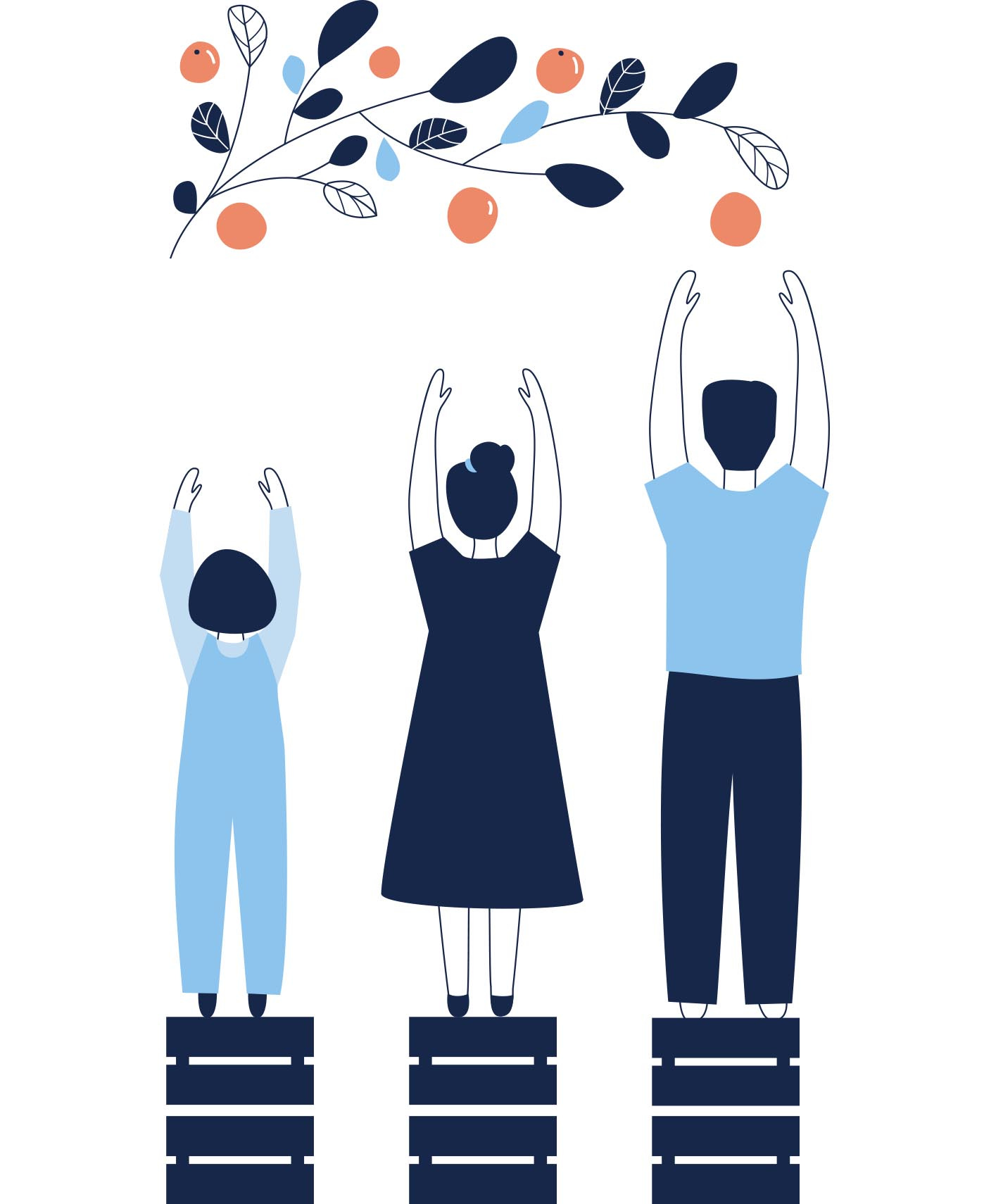Dear Readers, I had some amazing comments and feedback from you all on last week’s edition. Here are a few of them:
Preeta Narain says: “‘Or else’ confuses me… that is definitely when you have no choice.” Interesting Preeta. ‘Or else’ may sound ominous at times or indicate a ‘no alternative’ situation depending on the context. Like the boss telling the employee “you accept the transfer to Timbuktu or else resign”.
Capt Sharma says, tongue in cheek: “What I have for dinner is Hobson's choice.” As you all know Hobson’s choice is no choice at all. It is a take it or leave it situation. Captain, if Mrs Sharma reads this, you may go hungry tonight 😁
Rama and Shahji also allude to Hobson's choice. If you are waylaid by a thief who says, “Your money or your life!” what choice would you have?Murali says that the choice is clear when it comes to Instant Coffee and Filter Coffee. He also refers to ‘devil and the deep sea’ and ‘rock and a hard place’ as presenting two equally dangerous choices.
My good friend JJ Nereyeth tells me: “You forgot to mention Scylla and Charybdis. As per Homer, they were mythical monsters that were on either side of the strait between Sicily and the mainland. Scylla was apparently an area with submerged rocks and Charybdis was the name of a whirlpool”. If I may add, in Homer's Odyssey Scylla was a six-headed, man-eating Sea Monster. If Odysseus chose Charybdis he might have lost his entire fleet to the whirlpool. Instead, he chose to sail past Scylla and lose only six men to the beast.
The 4th of July marks American Independence day. I wish all my readers in the US of A ‘Happy Independence day!’
⚖ How Fair is Life?
Do you find this question easy or tough to answer? Given the current situation, many may say ‘life has been unfair’. There are two catchwords in this question: ‘fair’ and ‘life’. Even in this pandemic-dominated time, if you ask someone a simple question — ‘how’s life?’ — that person may say ‘unnerving’ or ‘could be better’ or ‘fine’ or ‘can’t complain’ or ‘boring’ or ‘life goes on’ or ‘chalta hai’. These answers may not dramatically change even if you changed the question to ‘How’s life treating you?’.
The moment you bring in the dimension of fairness and ask ‘Is life being fair to you?’ The answers can be quite different. It depends on whether the person looks at his own life or life in the society that he lives in. This could potentially make ‘fairness’ either a subjective or an objective attribute.
As always, let me relate the question to the way life unfolded for me, for my siblings and for my many cousins, when we were very young, as we grew up together in Mysore. For us it was just life and fairness did not feature in it. We lived happily together and carried on like anyone else. Even when we came across someone better placed in life, we felt no envy but aspired to get there someday (doesn’t it remind you of benchmarking?). Our lives were shrouded in minimalism. We were a large family living together in harmony. We did not have anything beyond basic. Yet we did not complain that life was being unfair to us. We were also fortunate that we were brought up in Mysore, where we hardly noticed anyone who was rich and whose kids lived a markedly better life. The absence of peer pressure helped us come to terms with what we had and be content.
The realisation about life being fair or unfair dawned on us much later in life as we became more conscious of not having what others had. When some sections of our joint family went nuclear, comparisons became obvious and inevitable. A pang of envy made us harbour feelings of entitlement. Why can’t I have what he has? A simple thing like a bicycle to ride to college triggered these feelings. That our parents could ill-afford to buy a cycle did not assuage the yearning but accentuated the unfairness meted out by life. The grievance shifted from parents to the metaphysical plane of life and how life had been unkind to us. Never did it occur that fairness is relative to what you have and what you aspire for.
As we grew older, we became aspirational but in a materialistic way. We wanted to be able to acquire things that we thought were denied to us. We did not pause to think that affordability and denial are two different things. If our parents could afford and yet had refused to give us what we wanted, we would have considered it unfair until realisation dawned that there were other pressing demands on that money. We would then realise that it was not life that was unfair to us but it was we who were unfair and insensitive.
Having lived long enough, if you look back, you realise that fairness is subjective and is often indicative of a degree of selfishness. Your mind might say: ‘What works for me is fair and I am not worried if it affects another person’. This does not mean that you would be unscrupulous or will have no qualms about taking advantage of others. It is just that a sense of entitlement overshadows any concern that you may have deep down for others. On the flip side, if you are disadvantaged by someone’s action, you might find yourself saying that life is unfair without realising that you failed to see what was coming or that you had let someone take advantage of your goodness or position.
This leads to the next question: Is life a competition? If so, is there room for fair play? The answer is not hard to see. We tend to compare ourselves with others and tell ourselves that life has not been fair to us and then go about trying to compete to be on par. It becomes clear very soon that you have been unfair to yourself by resorting to a catch-up game. You may even realise that your idea of fairness is your own wishful thinking.
I am not getting into the realm of fairness in dealing with others simply because life’s fairness to you is down to your perception of whether and how you have been denied something which some other known person may have been given. Take for instance ‘employee of the month’ award. You were expecting it but someone else was given that award. You then tell yourself that life has been unfair to you and you may even refuse to acknowledge the fairness of the process followed in giving that award. If one makes an effort to understand what it takes to be a winner it will help you unlock the potential in you. Life can be as fair to you as you are to others and to yourself.
On what basis one would conclude life is not fair? If you have food, shelter and a job that pays for your needs, you have no reason to complain. But when the insatiable urge to possess more is not soothed, life seems unfair. Life is not meant to be fair to anyone for that matter, Why should it be? The lack of fairness is an illusion you have created. You are never satisfied with what you have simply because you compare them with what others have. Then, you not only wallow in self-pity but also question the means by which the other person came into possession of things that prick your envious eyes. You end up making your own life unfair by your own actions and perceptions.
This pandemic has, to some extent, led people to believe that life has been unfair to all. If one were to look beyond one’s own home and empathise with the suffering or disadvantage of others, one may realise that life has not been unfair to you after all. This is ‘solipsism’ which I mentioned at the end of FC 52.
We ought to realise that the angst that we feel when we are denied something or could not attain what we wished for is a negative emotion that corrodes our rational thinking. A positive attitude in life helps us see matters in perspective. If we are able to install in the recess of our minds a ‘fairness prism’ through which to see what's happening all around us we might come to terms with those feelings.
I end this discussion with an anecdote, that I came across, which shows how one can deal with something unpleasant by presenting it in a positive manner:
The Smith’s were proud of their family tradition. Their ancestors had come to America on the Mayflower. They had included Senators and Wall Street wizards.
They decided to compile a family history, a legacy for their children and grandchildren. They hired a fine author. Only one problem arose – how to handle that great-uncle George, who was executed in the electric chair.
The author assured the family he could handle the story as tactfully as possible and was given the go-ahead to write the book.
The book appeared. It said “Great-uncle George occupied a chair of applied electronics at an important government institution and was attached to his position by the strongest of ties. His death came as a great shock.”
See you next week. Take care and be fair and life will seem fair.









Reminds me of a story from BG. (LONG READ ALERT)>>>>
Karna asks Krishna - "My mother left me the moment I was born.
Is it my fault I was born an illegitimate child?
I did not get education from Dhronacharya because I was considered a non Kshatriya.
Parshuram taught me but then gave me the curse to forget everything since I was a kshatriya.
A cow was accidentally hit by my arrow & its owner cursed me for no fault of mine.
I was disgraced in Draupadi's swayamvar.
Even Kunti finally told me the truth only to save her other sons.
Whatever I received was through Dhuryodhana's charity. So how am I wrong in taking his side?"
Krishna replies,
"Karna, I was born in a jail.
Death was waiting for me even before my birth.
The night I was born I was separated from my birth parents.
From childhood you grew up hearing the noise of swords, chariots, horses, bow and arrows.
I got only cow herd's shed, dung and multiple attempts on my life even before I could walk!
No army, no education.
I could hear people saying I am the reason for all their problems.
When all of you were being appreciated for your valour by your teachers, I had not even received any education.
I joined gurukula of Rishi Sandipani only at the age of 16!
You are married to a girl of your choice.
I didn't get the girl I loved & rather ended up marrying those who wanted me or the ones I rescued from demons.
I had to move my whole community from the banks of Yamuna to far off Sea shore, to save them from Jarasandh. I was called a coward for running away.
If Dhuryodhana wins the war you will get lot of credit.
What do I get if Dharmaraja wins the war? Only the blame for the war and all related problems.
Remember one thing Karna....
Everybody has challenges in life.
*LIFE IS NOT FAIR ON ANYBODY..*
Dhuryodhan also has a lot of unfairness in life and so has Yudhishthir.
But what is Right (Dharma) is known to your Mind (Conscience)....
No matter how much unfairness we got, how many times we were disgraced, how many times we were denied what was due to us, what is important is how you REACTED at that time...
So Stop whining!
Life's unfairness does not give you license to walk the wrong path of *अधर्म.*
Great topic, Prasanna! Loved ‘lack of fairness is an illusion we have created” I too relate to our childhood and growing years. Now it seems like a social malady..